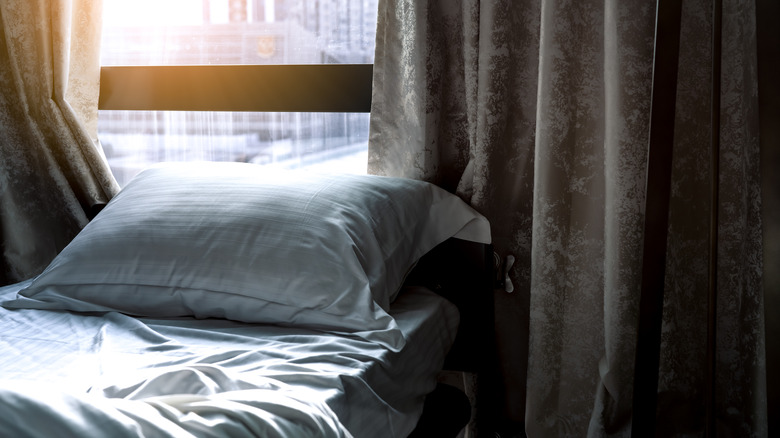Here's How To Protect Your Hair While You Sleep
Nighttime is one of the most vulnerable times for your hair. Between tossing and turning, the pulling of your pillowcase and the friction on your sheets, your strands can get pulled to their breaking point. If you've ever woken up wondering, "how did my hair get so coarse?" it's a good idea to implement some softening measures into your routine. Especially for those with colored hair or damaged strands, protecting your mane all night long will make a huge difference in its appearance and health.
Of course, sleeping on a silk or satin pillowcase is one of the most common ways people protect their hair. Cotton creates more friction against your strands as you sleep while pillowcases made with softer material provide less resistance as you toss and turn. Furthermore, this fabric also absorbs less of the natural moisture and oil from your hair, Healthline explains. Since dry hair is more likely to snap and break, this effect can save you plenty of headaches — and trips to the salon. If broken strands or frizzy hair are issues facing your locks, pick up a silk or satin pillowcase to mitigate the damage.
But, before you put your head on the pillowcase, make sure you've brushed out any tangles. Bustle notes that tangled hair can get worse throughout your snooze session, leading to breakage and more issues down the road. Find a gentle brush to remove snarls easily without too much pulling for best results.
Moisturize your hair while you sleep
In addition to adding protective materials like silk pillowcases and gentle hairbrushes, you can also use the nighttime to actually repair any damage done to your hair. Pureology suggests using a hydrating mask throughout the night to wake up with moisturized strands in the morning. Apply your treatment before you go to sleep, then place a sleeping cap or plastic shower cap around it. In the morning, the outlet recommends, gently rinse it out and reveal your fortified locks.
However, it's best to avoid sleeping on wet hair because this is the point at which your strands are at their weakest. Bustle recommends finding a microfiber towel that doesn't damage your hair — plus, it also reduces drying time for your mane. Furthermore, Healthline explains, sleeping on wet hair increases your risk of obtaining a fungal infection on your scalp which can cause dryness or even dandruff. Consider washing your hair in the morning or a few hours before you hit the sack.
Your hair is more fragile than you think, going easy on it — even while you rest — is important.

